Value Case Roundup: A Look at the Affordable
by Purav Sanghani on February 1, 2005 12:35 AM EST- Posted in
- Cases/Cooling/PSUs
Chenming 301KEBL
Chenming has been manufacturing PC cases for over 20 years. They have an extensive background in the sheet metal business and it shows in each of their products. Today, they are one of the largest OEM companies in the case industry and continue to offer their products and services around the globe. We had to include a Chenming case in our roundup and we chose the 301KEBL, which is based on Chenming's ATX-301KB design.
External Design
Chenming's trademark look has been implemented into the 301KEBL as it has been in many of their other products. The bezel features a door that opens out to the left to expose the four 5-1/4"; drive bays and two 3-1/2"; drive bays. The power and reset buttons are also hidden away behind the door to the right of the 3-1/2"; bays. A small, but useful, feature is the easy-to-remove drive bay covers that can be pulled off directly from the front of the case.
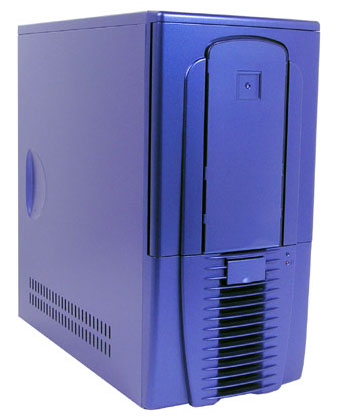
The bottom section of the bezel consists of the vents similar to the other cases in Chenming's product line. At the top of this section is a small fold-up door that hides two USB and one FireWire port. A quick glance may have us believe that there is nothing there, though. To the right of this door are the power and HDD activity lights.
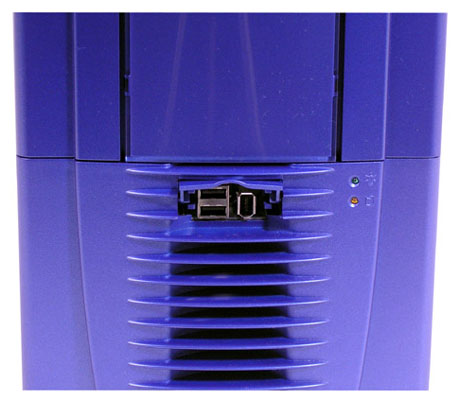
The side panels are bare except for two rows of vents at the bottom of the panels. Each panel can be removed easily to get to the inside.
Internal Design
The inside of the 301KEBL was something that we weren't expecting at all. Along with the standard four 5-1/4"; drive bays, there was a removable drive cage, which could fit up to four 3-1/2"; drives, two of them exposed. To remove this drive cage, we pushed the small lever back and pulled the drive cage back to remove it. This will certainly help install drives when screwing them in from both sides.
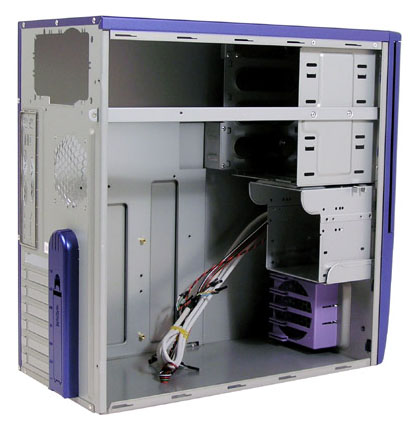
The motherboard tray accepts microATX and full ATX motherboards as the others do. Using standard stand-offs included with the case, we can mount our test board as well as various other boards into the 301KEBL.
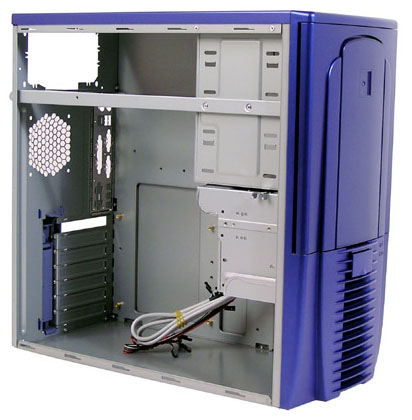
The expansion slots also have a feature similar to that on Foxconn's TK-09. The expansion slot mounts protrude out the back of the case and are covered by a blue plastic casing. This casing also houses extra screws to keep them in a handy place. To remove this casing, we push the stopper down from the inside and pull the plastic piece off from the back of the chassis.
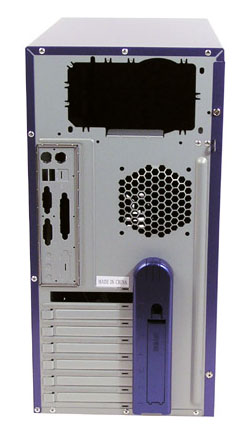










58 Comments
View All Comments
johnsonx - Tuesday, February 1, 2005 - link
First, thank you for this article. Yes, for our own personal rigs a nicer case is best, but many of us build relatively generic office computers as part of our jobs. Mostly I build Micro-ATX boxes using the InWin L545 micro-tower chassis, and some with the newer InWin BT-series desktop/tower convertable, but I do often need to build something more full sized.My request, like one or more others said:
Please, at least a few words about the power supply included with each case.
If I have to buy a $25 case and then add a $40 power supply, I might as well have just bought one of the low-end Antec cases for $60 that includes an Antec 350 watt power supply. At least then I know I've got a good power supply. Sure, most of the Antec cases aren't exactly attractive, but they don't offend either.
Also, it might be nice if your features table also listed the steel thickness of each case. Nothing says cheap like flimsy steel.
LX - Tuesday, February 1, 2005 - link
My info is a bit outdated.The last case+PSU that appealed to me was the Sonata.
Is there something better (quieter, cooler, better PSU, whatever) now at the same price range?
Thanks.
tokath - Tuesday, February 1, 2005 - link
Some of those cases ie the linkworld have horrible power supplies in them. A company I used to work for sold them, we had a ton of them back and most of those systems were low level athlon and celeron systems. Heh even with raidmax and powmax we didnt have as huge of a failure rate and thats not saying much :)Pollock - Tuesday, February 1, 2005 - link
I hear you, #9. However, at this point, I think it's safe to say that article has been canned.Glassmaster - Tuesday, February 1, 2005 - link
#11, 13: Every single one of those PSUs included in those cases in on my list of PSUs you shouldn't use (for an Athlon 64 system, don't know about any other platforms). I have compiled the list based on PSUs that I have seen found to be underpowerd/unreliable during 6 months of troubleshooting Athlon 64 systems in the offical AMD forums. A PSU was included if replacing the PSU solved the POSTing/Booting/Stability issues, or if the PSU was clearly overrated. I would not trust even $500 of hardware to any of these PSUs.The article should come with a disclaimer warning not to use any of these PSUs in a Athlon 64 and also probably a P4 or some of the earlier systems that others have suggested. Cheap PSUs, like these, are much more likely damage a user's system when they are over stressed and fail, than are quality units. It's not worth having even a few people have their hardware ruined (as we have seen many times on the AMD Athlon 64 board), just trying to save $20-30.
I would also like to see a PSU roundup.
Glassmaster.
Bonesdad - Tuesday, February 1, 2005 - link
"Personally I find most of these cases more aesthetically pleasing then the gaudy and flashy hyped up "gamer" cases typically reviewd by AnandTech. " - from #30Gotta agree here...why does this site continue to review that silly looking crap? There are plenty of professional, excellent cases out there that deserve to be reviewed in a professional way, like AT does. I hope never to see another gaudy, childish PC case on this site again.
Do more case reviews AT, just not "gamer" cases.
flexy - Tuesday, February 1, 2005 - link
http://www.silentpcreview.com/article75-page2.htmlevercase 4252 mentioned and reviewed there, also, they used this case for their "StealthPC" mod.
For everyone on a budget and wanting a GOOD case i seriously recommend looking at this case.
flexy - Tuesday, February 1, 2005 - link
i cant believe that you left out the Evercase 4252 which is only $32 and got excellent reviews at many places. Overclockers.com and everyone raves about this case and it has *excellent* airflow and i saw it even listed on http://www.intel.com/cd/channel/reseller/asmo-na/e...as "thermally advanced".,
The evercase 4252 also has a 120mm fan in the back which provides excellent airflow.
I cannot understand that you gave the award to a case with only a measly 80mm fan...the next case i will get for sure will have a 120mm fan in the back to provide sufficient airflow if needed.
Also...some people's argument: "If you buy a $30 case then you probably put in cr*p compnents"
I just can laugh...i especially laugh at people who buy $300 cases and then a $160 video card and a $100 CPU as main components in their systems :)
The last case i had (an Enlight 7252) did a great job for almost 4 years now...including the PSU which was included...and the case incl. a decent CPU (for the XP1900 i had w/ 9800Pro) was only $52.
My next build will have ALL high-end components (XP850XT PE, A64 3500+, Enermax PSU, OCZ Ram, XP-120)...and since i am saving the money and dont spend on unnecessary "gadgets" i am still reusing my old Enlight case..knowing it might not be optimal.
If i feel like it (maybe in a few months) i might get the Evercase 4252 w. a nice variable 120mm in back, and this case is also only $30 as said before.
I recommend you doing research first before laughing at people who spend $30 or so on a case...its only a freakin' case...but as said also in the budget section there are GOOD ones !
Rand - Tuesday, February 1, 2005 - link
Personally I find most of these cases more aesthetically pleasing then the gaudy and flashy hyped up "gamer" cases typically reviewd by AnandTech.The Raidmax case looks quite nice IMHO, in terms of pure aesthetics it's an excellent design. Asia Pro model isn't bad for someone that wants something a bit more flashy. The Foxconn model looks halfway decent aesthetically.
Even the CodeGen and Powmax cases don't look too bad even though I don't care for them myself.
Linkworld 3210 looks like a fine option for those that want an easily portable case, that looks a bit more showoffish then the RaidMax case.
For the price these cases sell at, as long as they don't have too many sharp edges and the case/PSU holding isn't overly flimsy I'd be perfectly willing to use a few of them.
These cheaper models may not be toolless, but IMHO that's not particularly a big loss.
Using a few screws isn't particularly stressful, given the cost savings.
I'm also not sure I agree with other posters that anyone looking at a budget case should be buying Dell.
Dell's cases aren't typically any more aesthetically pleasing as these are, and at least going DIY even with a budget case you can buy whatever components you wish with no worries of any proprietary hardware, or a motherboard that's pretty much limited to what's already installed.
A handful of these cases seem perfectly acceptable budget offerings that I wouldn't feel at all disadvantaged by using in my own systems.
Maybe not as nice as something like the Antec Sonata, but given the cost savings their quite decent.
My only real complaint about this review is that a few of these cases come stock with a PSU... yet that's not even mentioned let alone tested.
Granted the stock PSU's are likely to be pretty crappy generic models, but if someone wants to build a cheap PC from some older PIII era hardware they have lying around it might be adequate.
It's not altogether impossible for a low end case to come with a half way decent PSU suitable for low to midrange hardware either, while it's rare I have seen budget cases that come stock with some an older 300W Fortron PSU, whose budget PSU's are usually quite decent.
epiv - Tuesday, February 1, 2005 - link
I built many computers for family members and friends. I would never use very cheap stuffs for computers I built. I do not think it is worth my time to built crap.If someone just want a cheap computer. I would just order a Dell for them. I ordered a few Dell systems without OS for less than $300 for people need cheap computers.